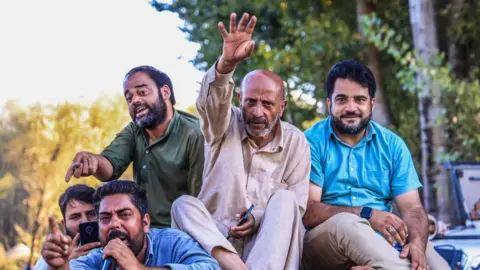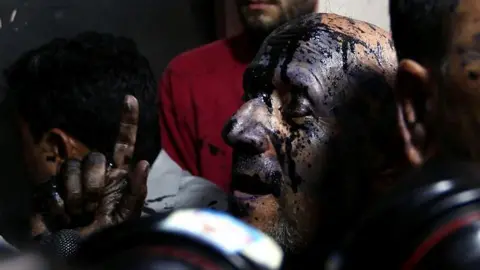 Getty Images
Getty ImagesAs Indian-administered Kashmir prepared for assembly elections earlier this month, a local MP returned home from a Delhi prison to campaign for his candidates. Who is he and why does his return matter to the region’s politics? Auqib Javeed reports from Srinagar.
Sheikh Abdul Rashid, who had been in jail since Article 370 was abrogated in 2019, was granted interim bail earlier this month on terror funding charges he denies.
The 57-year-old, who is popularly known as Engineer Rashid, has urged people to vote for his candidates instead of regional or national parties. His Awami Ittehad Party has fielded candidates on more than three dozen seats.
The high-stakes assembly elections are the first since the region’s autonomy was revoked in 2019. With 873 candidates across 97 constituencies in the Muslim-majority Kashmir valley and Hindu-majority Jammu, the elections have been described by federal officials as a proof of normalcy in a region long plagued by insurgency. The third and last phase of the polls will be held on Tuesday and votes will be counted on 8 October.
Kashmir’s politics, dominated by mainstream parties pledging allegiance to India, has had a history of individuals and groups seeking separation from the country or enhanced autonomy for Kashmir, with some of them supporting an armed movement to achieve that.
Some separatist groups in the past have also backed Pakistan’s role in Kashmir. India and Pakistan both claim Kashmir in full, but control only parts of it.
But this assembly election has seen participation of many former separatist leaders as well.
Rashid has chosen to be part of the democratic process but has been vocal against what he calls Delhi’s “heavy-handed” rule in Kashmir.
He is known for his fiery speeches, and leading protests in unconventional ways against alleged government excesses, often irking authorities.
He made waves in June when he defeated regional political heavyweight Omar Abdullah in parliamentary elections. While he was lodged in jail, his sons led an emotionally charged and successful campaign on his behalf.
But this time he is able to speak to voters directly and he has also smartly used social media to amplify his messages.
 Getty Images
Getty ImagesWithin hours of being released on 11 September, Rashid told the media that he was going to fight against the removal of Article 370.
The article allowed the state its own constitution, a separate flag and freedom to make laws. Foreign affairs, defence and communications remained the preserve of the federal government.
“We don’t accept Prime Minister [Narendra Modi’s] decision taken on 5 August [2019],” he said, referring to the day when the autonomy was abrogated.
He then went live on Facebook, repeating similar messages. The hour-long speech currently has more than 2.5m views, 44,000 likes and 25,000 comments – an unusually high number for a regional politician.
Rashid’s popularity worries his regional opponents, who have termed him a “proxy” of Modi’s Bharatiya Janata Party (BJP).
Two former chief ministers of the state and the heirs of leading regional parties, Mehbooba Mufti and Omar Abdullah, have publicly questioned his party’s funding and alleged that he was dividing voters to favour the BJP.
He has repeatedly denied the allegations. “If I were a BJP man, I wouldn’t have spent over five years in jail,” he told the BBC. “I won [almost] 500,000 votes in the general elections, how could I be dividing votes?”.
Prof Sheikh Showkat Hussain, a political analyst, said Rashid’s release from jail just days before the elections did give his opponents a pretext to accuse him of collusion with the BJP-run federal government in Delhi.
“Despite these allegations, his win in the 2024 parliamentary elections from jail has given him an unprecedented credibility in the eyes of the locals,” he said.
Rashid has also worked hard to carefully craft his image.
Unlike the valley’s prominent leaders who have established political lineages, Rashid has managed to establish an image of a “common man’s politician” who doesn’t shy away from taking on authorities.
In 2012, he attempted to bring dozens of dogs into the state secretariat as a protest against the government’s inaction on the growing canine menace in his constituency, where numerous dog bite incidents had been reported.
“I hope the ministers and bureaucracy now understand the seriousness of the issue,” he said at the time.
But Rashid’s bluntness and candour have also landed him in trouble.
In 2015, he hosted a “beef party” to protest a ban on the slaughter of cows, considered sacred by many Hindus, in several states. A day later, members of the BJP, then a part of the state’s ruling coalition, assaulted him in the assembly.
A few days later, members of a Hindu group outraged by the “beef party” attacked him at Delhi’s Press Club, dousing his face with ink as he protested the lynching of a Kashmiri truck driver accused of cow smuggling in Jammu.
 Getty Images
Getty ImagesRashid’s unusual protests have often addressed the alleged human rights violations in the Kashmir valley, a charge that the federal government denies.
On International Human Rights Day in 2015, his party marched through Srinagar with a cow, a mule, a goat, and a dog, holding placards saying, “Animals have more rights than people in Kashmir.” He and other leaders were detained.
His family members say they are not surprised by his politics as he had a “rebellious nature” since childhood.
“He used to protest against the human rights violations, presence of military bunkers, forced labour by the army,” said his brother Khurshid Ahmad Sheikh.
In 2008, he resigned from his government job as an engineer to contest assembly elections, winning twice in a row as an independent candidate.
Once elected to the state assembly, he gained recognition across Kashmir for protesting against what he called the government’s “anti-people” policies, analysts say.
“The element of protest makes him popular. He has been a crowd-puller since he entered politics,” said Noor Mohammad Baba, a political analyst based in Kashmir.
His jail term has intensified public interest in his rallies, he added.
At a recent rally, an enthusiastic group of men assembled to listen to him. Some of them were curious onlookers hoping to see the man in the news, and some were his fans.
Did the allegations of Rashid being a “proxy of Delhi” bother them?
“Almost all the regional parties have been in an alliance with the BJP [in the past]. They aren’t in a position to allege him of complicity with the BJP,” said Rafiq Ahmad, a businessman. “People want to give Rashid a chance and see what he does.”
Rashid spoke and demanded a resolution to the Kashmir conflict and an end to the use of anti-terror laws to put Kashmiris in jail. Young men shouted in unison in support.
Within minutes, Rashid was on his way to his next public meeting.

